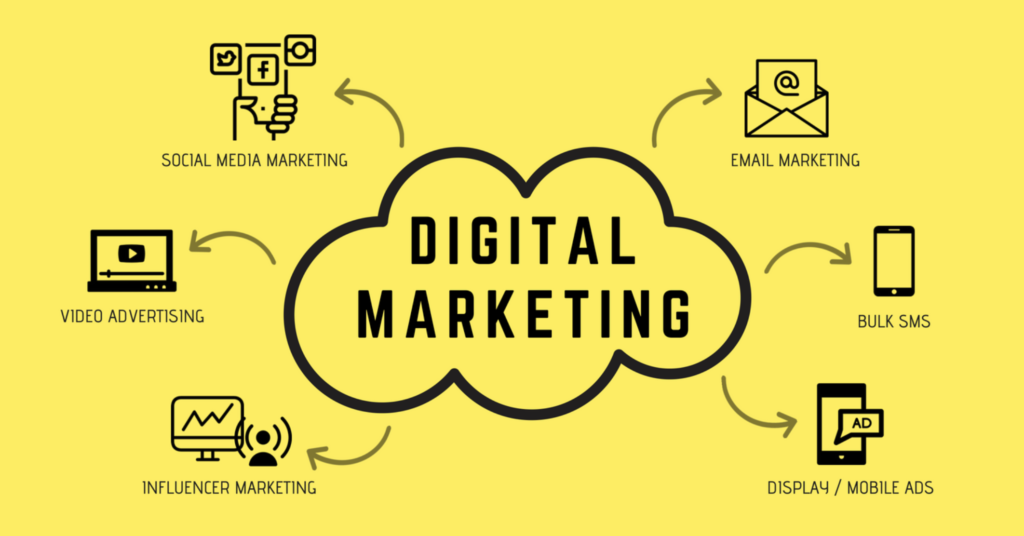In today’s digital age, having a strong online presence to Boost Your Business Online is crucial for any business looking to grow and succeed. The internet provides a vast array of opportunities to reach potential customers, increase brand visibility, and drive sales. However, navigating the digital landscape can be challenging without the right strategies. This comprehensive guide will explore effective tactics for boosting your business online through digital marketing, offering detailed insights into various methods and best practices.
Table of Contents
- Introduction to Digital Marketing
- Understanding Your Audience
- Building a Strong Online Presence
- Website Optimization
- Search Engine Optimization (SEO)
- Content Marketing
- Leveraging Social Media
- Choosing the Right Platforms
- Social Media Advertising
- Engaging Content Creation
- Email Marketing
- Building an Email List
- Crafting Effective Email Campaigns
- Automation and Personalization
- Pay-Per-Click (PPC) Advertising
- Google Ads
- Social Media Ads
- Retargeting Strategies
- Analytics and Data-Driven Decisions
- Tracking Key Metrics
- Using Tools like Google Analytics
- A/B Testing
- Building Brand Authority
- Influencer Marketing
- Guest Blogging
- Online Reviews and Reputation Management
- Conclusion

1. Introduction to Digital Marketing
Digital marketing encompasses all marketing efforts that use an electronic device or the internet. Businesses leverage digital channels such as search engines, social media, email, and websites to connect with current and prospective customers. Unlike traditional marketing methods, digital marketing allows for real-time engagement and more precise targeting.
2. Understanding Your Audience
Before diving into specific tactics, it’s essential to understand your target audience. Knowing who your customers are, their preferences, and their behavior online will help tailor your marketing strategies more effectively.
- Customer Personas: Develop detailed customer personas that include demographics, interests, pain points, and buying behavior. These personas guide your marketing efforts and ensure your messages resonate with your audience.
- Market Research: Conduct market research to identify trends and insights into your industry. Use tools like surveys, focus groups, and online analytics to gather valuable data.
3. Building a Strong Online Presence : Boost Your Business Online
Website Optimization
Your website is often the first point of contact for potential customers. Ensuring it is optimized for user experience (UX) and search engines is critical.
- User-Friendly Design: A clean, intuitive design helps keep visitors engaged. Ensure your site is easy to navigate, with clear calls-to-action (CTAs).
- Mobile Optimization: With more users accessing websites via mobile devices, having a mobile-friendly site is essential. Use responsive design to ensure your site looks great on all devices.
- Page Speed: Slow-loading pages can drive visitors away. Optimize images, use a content delivery network (CDN), and minimize code to improve load times.
Search Engine Optimization (SEO) : Boost Your Business Online
SEO is the process of improving your website’s visibility in search engine results pages (SERPs). Higher rankings can lead to increased organic traffic.
- Keyword Research: Identify relevant keywords that your target audience is searching for. Use tools like Google Keyword Planner and Ahrefs to find high-traffic, low-competition keywords.
- On-Page SEO: Optimize your website’s content and HTML source code. Include keywords in titles, meta descriptions, headers, and content. Ensure your site structure is logical and uses proper heading tags.
- Off-Page SEO: Build backlinks from reputable sites to increase your domain authority. Guest blogging, influencer collaborations, and content partnerships can help generate quality backlinks.
Content Marketing : Boost Your Business Online
Content marketing involves creating and sharing valuable content to attract and engage your audience.
- Blogging: Regularly publishing informative and engaging blog posts can drive traffic to your site and establish your authority in the industry. Focus on topics that address your audience’s pain points and interests.
- Video Content: Video is a highly engaging format that can be used for tutorials, product demos, testimonials, and more. Platforms like YouTube and social media channels are great for sharing video content.
- Ebooks and Whitepapers: Offering in-depth content like ebooks and whitepapers can capture leads by requiring users to provide their contact information to download.
4. Leveraging Social Media
Choosing the Right Platforms
Not all social media platforms are created equal, and it’s important to choose the ones that align with your target audience and business goals.
- Facebook: Great for building a community and engaging with a broad audience through posts, stories, and ads.
- Instagram: Ideal for visually-driven businesses, especially in fashion, food, and lifestyle sectors. Utilize stories, reels, and IGTV for varied content.
- LinkedIn: Best for B2B marketing, professional networking, and sharing industry insights.
- Twitter: Useful for real-time engagement, customer service, and sharing news and updates.
Social Media Advertising : Boost Your Business Online
Paid social media advertising allows you to reach a larger audience and target specific demographics.
- Ad Formats: Different platforms offer various ad formats, including image ads, video ads, carousel ads, and sponsored posts. Choose the format that best showcases your message.
- Targeting: Use advanced targeting options to reach your ideal audience based on demographics, interests, behavior, and location.
- Budgeting: Start with a small budget and scale up as you see positive results. Monitor your ad performance and adjust your strategy as needed.
Engaging Content Creation : Boost Your Business Online
Creating engaging content is key to building a loyal social media following.
- Consistency: Post regularly to keep your audience engaged. Use a content calendar to plan and schedule posts.
- Interactive Content: Encourage interaction through polls, Q&A sessions, live videos, and user-generated content campaigns.
- Visual Appeal: High-quality images and videos are more likely to capture attention. Use design tools like Canva to create visually appealing content.
5. Email Marketing
Building an Email List
An email list is a valuable asset for any business, allowing you to reach customers directly.
- Opt-In Forms: Place opt-in forms on your website, blog, and social media channels. Offer incentives like discounts, freebies, or exclusive content to encourage sign-ups.
- Segmentation: Segment your email list based on demographics, behavior, and preferences to send more targeted and relevant emails.
Crafting Effective Email Campaigns
Email marketing campaigns can nurture leads, promote products, and drive conversions.
- Personalization: Personalize your emails with the recipient’s name and tailor content based on their preferences and behavior.
- Compelling Subject Lines: A strong subject line can significantly impact open rates. Keep it concise, clear, and intriguing.
- Valuable Content: Provide value in every email, whether it’s through informative content, special offers, or engaging stories.
Automation and Personalization
Email automation can save time and improve efficiency, while personalization enhances the customer experience.
- Automated Workflows: Set up automated workflows for welcome emails, abandoned cart reminders, and post-purchase follow-ups.
- Dynamic Content: Use dynamic content to personalize emails based on the recipient’s behavior and preferences.
6. Pay-Per-Click (PPC) Advertising : Boost Your Business Online
Google Ads
Google Ads allows you to reach potential customers through search engine marketing (SEM).
- Keyword Bidding: Bid on keywords relevant to your business to display ads in Google search results. Focus on high-intent keywords that indicate a readiness to purchase.
- Ad Copy: Write compelling ad copy that highlights the benefits of your product or service and includes a strong call-to-action.
- Landing Pages: Ensure your landing pages are optimized for conversions with clear messaging, engaging visuals, and easy navigation.
Social Media Ads
Advertising on social media platforms can complement your overall digital marketing strategy.
- Audience Insights: Utilize the platform’s audience insights to target your ads effectively.
- Creative Assets: Create visually appealing and engaging ads that resonate with your audience. Test different creatives to see what performs best.
- Ad Performance: Regularly review ad performance metrics and adjust your campaigns to improve results.
Retargeting Strategies : Boost Your Business Online
Retargeting ads help you reach users who have previously interacted with your website or social media profiles.Boost Your Business Online
- Pixel Implementation: Install tracking pixels on your website to collect data on visitor behavior.
- Customized Ads: Create customized ads that remind visitors of the products or services they viewed, offering incentives to encourage conversion.
7. Analytics and Data-Driven Decisions
Tracking Key Metrics
To measure the effectiveness of your digital marketing efforts, it’s crucial to track key performance indicators (KPIs).
- Traffic Sources: Understand where your traffic is coming from (organic, paid, social, referral) to allocate resources effectively.
- Conversion Rates: Track the percentage of visitors who take desired actions, such as making a purchase or signing up for a newsletter.
- Engagement Metrics: Monitor metrics like bounce rate, time on site, and pages per session to gauge user engagement.
Using Tools like Google Analytics
Google Analytics is a powerful tool for tracking and analyzing website data.
- Dashboard Setup: Customize your Google Analytics dashboard to display the most important metrics for your business.
- Goals and Funnels: Set up goals and conversion funnels to track the customer journey and identify drop-off points.
- Regular Reporting: Generate regular reports to assess performance and make data-driven decisions.
A/B Testing
A/B testing involves comparing two versions of a webpage, email, or ad to see which performs better.
- Test Elements: Test different elements such as headlines, images. Boost Your Business Online. CTAs, and layouts to determine what resonates best with your audience.
- Analyze Results: Use the data from A/B tests to make informed decisions and continuously optimize your marketing efforts. Boost Your Business Online
8. Building Brand Authority : Boost Your Business Online
Influencer Marketing
Collaborating with influencers can expand your reach and enhance your
brand’s credibility.
- Identify Influencers: Choose influencers whose audience aligns with your target market and who share similar values.
- Authentic Partnerships: Build authentic partnerships where influencers genuinely endorse your products or services.
- Measure Impact: Track the impact of influencer campaigns through metrics like engagement, reach, and conversions.
Guest Blogging : Boost Your Business Online
Guest blogging on reputable websites can drive traffic and build your authority in the industry.
- Identify Opportunities: Find websites and blogs in your industry that accept guest posts.
- Quality Content: Write high-quality, valuable content that showcases your expertise and includes backlinks to your site.
- Networking: Use guest blogging as an opportunity to network with other industry leaders and build relationships.
Online Reviews and Reputation Management
Online reviews significantly impact your business’s reputation and customer trust.
- Encourage Reviews: Ask satisfied customers to leave positive reviews on platforms like Google My Business, Yelp, and social media.
- Respond to Feedback: Respond to all reviews, both positive and negative, in a timely and professional manner. Address any issues raised and show appreciation for positive feedback.
- Monitor Your Reputation: Use tools like Google Alerts and reputation management software to monitor mentions of your brand online.
9. Conclusion
Boosting your business online requires a strategic approach to digital marketing. By understanding your audience, building a strong online presence, leveraging social media, implementing effective email marketing, and utilizing PPC advertising, you can drive growth and achieve your business goals. Continuously analyze your performance and adapt your strategies based on data-driven insights to stay ahead in the competitive digital landscape. Embrace these tactics to enhance your brand’s visibility, engage with your audience, and ultimately, grow your business online.

Add a Comment